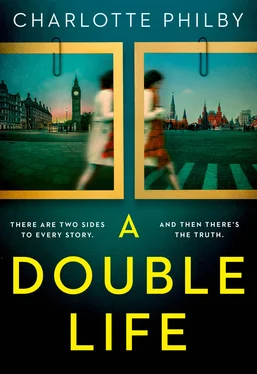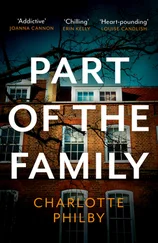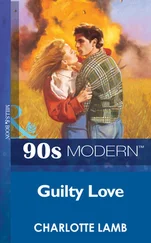Above, I hear the distant calling of a crow as I lower myself beneath a thick canopy of trees. Pulling my hoodie closer around me, I shiver, the air cold and dank as I weave beneath the branches; by now my head is throbbing, the silence no longer comforting.
Finding a spot, I squat down in the shade of the tree, trying not to pee on my bare feet. Just as the relief comes, a warm trickle forming a pool beneath me, I feel my skin scratch against something sharp, a twig or a piece of glass.
The unexpected sharpness of it makes me jump and I glance down, a sliver of dark red blood trickling down my ankle.
‘Shit,’ I mutter, unsteady as I balance my weight on just one foot, lowering myself into a dark patch of moss and rummaging through my bag for anything that vaguely resembles a tissue. As my fingers comb the contents of my bag, I forget about the tissue, distracted by a more pressing realisation. Patting with increasing desperation amidst the crumbs and the loose tobacco lining the bottom of my bag, waiting for the tell-tale brushing of my skin against the small plastic baggy containing the hash. I can’t have lost it, but I have. My fingernails dig into the palms of my hand at the memory of how much I had paid Tariq for that quarter.
Briefly I consider turning back, retracing my steps to the bench, but the thought fills me with fear, imagining the morning runners and the early-bird mothers with their toddlers who by now could well be roaming the pathway.
What I need is to get home, back to a safe space in which to let my mind melt into perfect nothingness. Slowly I stretch my legs back to standing position, ready to retreat to the safety of my flat with its four solid walls to fester behind. One moment I am standing, feeling my shorts brushing against my thighs; the next I hear a scream, which at first it might be another crow circling in the distance. And then I hear voices, unmistakably human, like a wall clattering down around me, fixing me to the ground.
For a moment in my disorientated state, I wonder if I have imagined it. It wouldn’t be the first time, after all. But then they are there again, close enough that I can almost smell their breath. Taking a slow step forward, a twig quietly crunching beneath my foot, I hear a man’s voice again, this time followed by a name: Eva . Amidst a distorted mush of syllables, a language I cannot understand, I hear the girl speak; I don’t know the words but the meaning is clear. Stop, she is saying. Please stop!
The man’s presence hangs in the air like an omen. Willing my body not to move, I feel my weight shift involuntarily below me as the air struggles for space in my chest. Any second now one of the twigs beneath my feet will crack under the pressure.
I am like an animal under attack, each of my senses amplified so that every smell, every sound, every taste rushes through my body all at once. And then I hear it, the snap as a tiny shard of wood gives way beneath the heel of my bare foot.
I feel the girl’s face before I see it, turning slowly towards me. Time seems to slow down as the image is scored onto my memory: the dark unblinking brown eyes, pupils frozen in horror. For just a second our gazes lock, a bolt running down my spine, and then, without another thought, I feel my body rise.
No longer aware of the blood gathered in clots at my toes, I lunge towards my escape route, a tunnel of light spilling through the clearing; I manage two giant steps, my feet guiding me through a rotten knot of roots and bark. And then it comes, the scream, chasing me down the hill. I know it instantly: the sound of a life being torn out by the roots.
That first summer with Tom passed by in a haze of picnics on the Heath, and evenings spent with her dad at the house watching TV in easy silence while Tom attended rehearsals with his band – an anachronistic jazz four-piece that at least explained the terrible dress sense. The nights he was around, and she wasn’t working at the pub on Arlington Road where she did four shifts a week behind the bar, they spent at his place, her skimming through textbooks for the final year of her degree. He cooked and washed up, helping her sort through the endless paperwork relating to her mother’s estate, finding ways to care for her when she was incapable of caring for herself.
Unable to deal with it personally, Gabriela had handed the task of clearing her mother’s house to a company in the West Country which Tom had found – recommended through a friend of a friend. She had visited just once, refusing his offer to accompany her, and collected a single box of photo albums and books before renting the place out through a local estate agent. She had always hated that house – or rather what it represented: the choice her mother had made to move out of London; her decision to abandon her only child wrapped up in the guise of selflessness, a refusal to uproot her at such a pivotal time in her life. I couldn’t do that to her , she would overhear her mother tell her friends. Not that she’d ever asked Gabriela if she’d wanted to stay.
‘So you were abroad when your mum …’ Tom mustered the courage to ask one night as they sat at his table, poring over papers.
‘How do you know that?’ Gabriela asked.
‘Saoirse mentioned it. Sorry, if you don’t want to talk about it—’
‘It’s fine,’ she cut in. ‘I was in Paris, finishing off my placement.’ She swallowed as she formed the words, her gaze held steadfast to the page.
Paris had pulled her in like the warm embrace she longed for, that year at the Sorbonne. Arriving in the July and staying until the following summer, with intermittent trips back to London, wafting between her tiny apartment above the bric-a-brac store on the Rue Galande and the university. With every step, she felt herself becoming someone new: the sort of person who sat in the grounds of the Greek church overlooking Notre Dame, sketching the spires that rose above the scaffolding; the sort of person who would go to the cinema at the end of her street, alone, to watch art-house films; the sort of person she and Saoirse would have called a cunt. But Saoirse wasn’t there and she was, and for as long as her sojourn lasted, London, and everything that it entailed, simply didn’t exist. And for that, she could not have been more grateful.
Within a couple of weeks in the city, Gabriela found a job at one of the cafés on the Place de la Sorbonne, serving overpriced coffee and stale croissants to tourists and overworked professors; the convenience of the location made up for the pitiful wage and the wandering hands of the maître d’. It was here that she met Pierre, as genuinely pretentious as the version of herself she had created, but so good-looking and so French , his opinion of himself so robust that it was difficult not to believe he was the god his body language told you he was.
He was sitting on one of the chairs in the square at the end of summer, smoking a cigarette, the first time she noticed him watching her as she moved between tables so that her skin tingled with the unnerving thrill of it. When she went over to ask him what he wanted, he dipped his eyebrows and pulled on his Gauloise in a way that told her exactly what, or who, he wanted. And she was in the mood to give it to him. Intermittently, from then on, she spent nights at Pierre’s flat overlooking the Seine, one of a number of properties his father owned along this stretch, not far from the Hôtel de Ville. They were in the bar next door, eating breakfast, his leather jacket slung over the back of her chair, his helmet held on his lap like a baby, the day death came.
To her credit, Valentina had never pushed for Gabriela to stay in England; she never so much as attempted to make her feel guilty for wanting to go even once it was confirmed that the cancer had returned. If anything, it might have been a relief, not to have to make room to deal with her daughter’s feelings alongside her own.
Читать дальше












